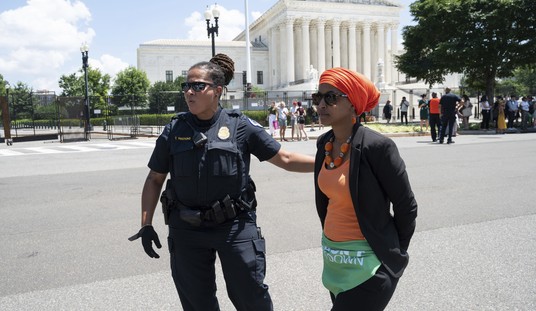There’s been a lot of buzz online, mostly from Democrats, about Russia apparently having spent $100,000 on Facebook ads to try to prop up President Trump and beat the already self-immolating Hillary Clinton in last year’s presidential election. The general consensus on the left seems to be that Russia bought a Trump victory with what would be a pretty average salary in Washington, D.C., or San Francisco, or Manhattan, so now we’re going to double down on calls to regulate Facebook because Big Bad Vlad bought some links to Matt Boyle posts, or Gateway Pundit, or Cernovich.

In this image provided by SpaceX a leftover booster rocket lands at Florida’s Kennedy Space Center, Thursday, Sept. 7, 2017. SpaceX launched the Air Force’s super-secret space shuttle on Thursday, a technology tester capable of spending years in orbit. It’s the fifth flight for one of these crewless mini shuttles, known as the X-37B Orbital Test Vehicle. (SpaceX via AP)
Sure, there is a plausible argument to be made that that $100,000 could have had a way bigger impact than a lot of Republican tech consultants seem to think. But while the left continues its fainting spells over what looks to me like far more of an experimental, low dollar effort than a high-end, super-smart, well-funded, well-executed strategy, we’re failing to discuss a really serious Russia problem that people should be freaking out about. Let me reiterate: People should be legitimately freaking out about this.
According to the Wall Street Journal, there are concerns that the US could remain reliant on Russian-made rocket engines beyond 2022 because, guess what, a big legacy defense contractor that uses them (United Launch Alliance, a Boeing-Lockheed joint venture) hasn’t managed to get it together to start making rocket engines that aren’t, you know, Russian.
ULA already gets paid $860 million just to exist, and even more to actually conduct launches (the Air Force is essentially shelling out $420 million per launch to ULA), so it’s pretty ridiculous that a) ULA hasn’t solved this problem yet and b) ULA wants yet more taxpayer money when it doesn’t seem to be doing what it should with what it’s already been given. Rep. Mike Rogers has taken a fairly tough line on this so far in this year’s NDAA.
As a reminder, the US doesn’t actually send our own astronauts into space anymore, either; we rely on Russia to do that, too. So the bottom line is, for a bunch of national security and military-oriented stuff we do in space, we’re heavily dependent on Russia, a major global adversary. Oh, and because of ULA’s purchase of Russian rocket engines with your and my money, we’re probably inadvertently funding Russian military aggression in places like Ukraine to the tune of $540 million.
It’s time for Congress to put a stop to all this and quit squandering taxpayer dollars and helping out the Russians. If ULA can’t figure out how to rely on US-made engines by 2022, when the Air Force says we are to be done with the Russian-made engines, then maybe SpaceX and Blue Origin (or other companies using US-made technology) should just conduct all national security-linked space launches. It will probably be cheaper that way, too: The Journal notes that “launches of Falcon 9 rockets built by SpaceX, as Mr. Musk’s company is called, start at less than $83 million for the military, more than 40% below traditional United Launch prices” and you can bet that Bezos entering the fray will keep prices down and maybe even lower them further.














Join the conversation as a VIP Member